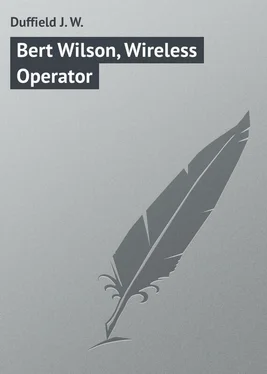J. Duffield - Bert Wilson, Wireless Operator
Здесь есть возможность читать онлайн «J. Duffield - Bert Wilson, Wireless Operator» — ознакомительный отрывок электронной книги совершенно бесплатно, а после прочтения отрывка купить полную версию. В некоторых случаях можно слушать аудио, скачать через торрент в формате fb2 и присутствует краткое содержание. Жанр: foreign_prose, foreign_children, на английском языке. Описание произведения, (предисловие) а так же отзывы посетителей доступны на портале библиотеки ЛибКат.
- Название:Bert Wilson, Wireless Operator
- Автор:
- Жанр:
- Год:неизвестен
- ISBN:нет данных
- Рейтинг книги:3 / 5. Голосов: 1
-
Избранное:Добавить в избранное
- Отзывы:
-
Ваша оценка:
- 60
- 1
- 2
- 3
- 4
- 5
Bert Wilson, Wireless Operator: краткое содержание, описание и аннотация
Предлагаем к чтению аннотацию, описание, краткое содержание или предисловие (зависит от того, что написал сам автор книги «Bert Wilson, Wireless Operator»). Если вы не нашли необходимую информацию о книге — напишите в комментариях, мы постараемся отыскать её.
Bert Wilson, Wireless Operator — читать онлайн ознакомительный отрывок
Ниже представлен текст книги, разбитый по страницам. Система сохранения места последней прочитанной страницы, позволяет с удобством читать онлайн бесплатно книгу «Bert Wilson, Wireless Operator», без необходимости каждый раз заново искать на чём Вы остановились. Поставьте закладку, и сможете в любой момент перейти на страницу, на которой закончили чтение.
Интервал:
Закладка:
“I suppose,” said Ralph, “that, as a matter of fact, there ought to be two or three shifts, so that someone could be on hand all the time. I know that the Company is considering something of the kind, but ‘large bodies move slowly,’ and they haven’t got to it yet.”
“For my part,” chimed in Tom, “I should think that with all the brains that are working on the subject, there would have been some way devised to make a record of every call, and warn the operator at any minute of the day or night.”
“They’re trying hard to get something practical,” said Bert. “Marconi himself is testing out a plan that he thinks will work all right. His idea is to get a call that will be really one long dash, so that it won’t be confounded with any letter of the alphabet. He figures on making this so strong that it will pass through a very sensitive instrument with sufficient force to ring a bell, that will be at the bedside of the operator.”
“Rather rough on a fellow, don’t you think?” joined in the ship’s doctor. “If he were at all nervous, he might lie there awake, waiting for the bell to ring. It reminds me of a friend of mine, who once put up at a country hotel. He was told that the man who slept in the next room was very irritable and a mere bundle of nerves. He couldn’t bear the least noise, and my friend promised to keep it in mind. He was out rather late that night, and when he started to retire he dropped one of his shoes heavily on the floor. Just then he remembered his nervous neighbor. He went on undressing quietly, walked about on tiptoe, put out the light, and crept into bed. Just as he was going off to sleep, a voice came from the other room: ‘Say, when in thunder are you going to drop that other shoe?’”
“In the meantime,” went on Bert, when the laugh had subsided, “they’ve got an ingenious device on some of the British ships. It seems rather cruel, because they have to use a frog. You know how sensitive frogs are to electricity. Well, they attach a frog to the receiving end, and under him they put a sheet of blackened paper. As the dots and dashes come in, the current jerks the frog’s legs over the paper. The leg scrapes the black away, and leaves white dots and dashes. So that you can pick up the paper and read the message just like any other, except that the letters are white instead of black.”
“Poor old frogs,” said Ralph. “If they knew enough, they’d curse the very name of electricity. Galvani started with them in the early days, and they’ve still got to ‘shake a leg’ in the interest of science.”
“Yes,” murmured Tom, “it’s simply shocking.”
He ducked as Ralph made a playful pass at him.
“There’s been quite a stir caused by it,” went on Bert, calmly ignoring Tom’s awful pun, “and the humane societies are taking it up. The probability is that it will be abolished. It certainly does seem cruel.”
“I don’t know,” said the doctor. “Like many other questions, there are two sides to it. We all agree that no pain should be inflicted upon poor dumb animals, unless there is some great good to be gained by it. But it is a law of life that the lesser must give way to the greater. We use the cow to get vaccine for small-pox, the horse to supply the anti-toxin for diphtheria. Rabbits and mice and guinea-pigs and monkeys we inoculate with the germs of cancer and consumption, in order to study the causes of these various diseases, and, perhaps, find a remedy for them. All this seems barbarous and cruel; but the common sense of mankind agrees that it would be far more cruel to let human beings suffer and die by the thousands, when these experiments may save them. If the twitching of a frog’s leg should save a vessel from shipwreck, we would have to overlook the frog’s natural reluctance to write the message. I hope, though,” he concluded, as he pushed back his chair, “that they’ll soon find something else that will do just as well, and leave the frog in his native puddle.”
When they reached the deck, they found that the breeze had freshened, and, with the wind on her starboard quarter, the Fearless was bowling along in capital style. Her engines were working powerfully and rhythmically, and everything betokened a rapid run to Hawaii, which the captain figured on reaching in about eight days. The more seasoned travelers were wrapped in rugs and stretched out in steamer chairs, but many of the others had already sought the seclusion of their staterooms. It was evident that there would be an abundance of empty seats at the table that evening.
Throughout the rest of the day the messages were few and far between. Before that time next day, they would probably have ceased altogether as far as the land stations were concerned, and from that time on until they reached Hawaii, the chief communications would be from passing ships within the wireless range.
The boys were gathered in the wireless room that night, telling stories and cracking jokes, when suddenly Bert’s ear caught a click. He straightened up and listened eagerly. Then his face went white and his eyes gleamed with excitement. It was the S. O. S. signal, the call of deadly need and peril. A moment more and he leaped to his feet.
“Call the captain, one of you fellows, quick,” he cried.
For this was the message that had winged its way over the dark waste of waters:
“Our ship is on fire. Latitude 37:12, longitude 126:17. For God’s sake, help.”
CHAPTER IV
The Flaming Ship
The captain came in hurriedly and read the message. He figured out the position.
“She’s all of sixty miles away,” he said, looking up from his calculation, “and even under forced draught we can’t reach her in less than three hours. Tell her we’re coming,” he ordered, and hurried out to give the necessary directions.
The course of the ship was altered at once, the engines were signaled for full speed ahead, and with her furnaces roaring, she rushed through the night to the aid of her sister vessel, sorely beset by the most dreaded peril of the sea.
In the mean time Bert had clicked off the message: “We’ve got you, old man. Ship, Fearless , Captain Manning. Longitude 125:20, latitude 36:54. Will be with you in three hours. Cheer up. If you’re not disabled, steam to meet us.”
Quickly the answer came back: “Thank God. Fighting the fire, but it’s getting beyond us. Hasn’t reached the engine room yet, but may very soon. Hurry.”
In short, jerky sentences came the story of the disaster. The steamer was the Caledonian , a tramp vessel, plying between Singapore and San Francisco. There was a heavy cargo and about forty passengers. A little while since, they had detected fire in the hold, but had concealed the fact from the passengers and had tried to stifle it by their own efforts. It had steadily gained, however, despite their desperate work, until the flames burst through the deck. A wild panic had ensued, but the captain and the mates had kept the upper hand. The crew had behaved well, and the boats were ready for launching if the worst came to the worst. The fire was gaining. “Hurry. Captain says – ”
Then the story ceased. Bert called and called again. No answer. The boys looked at each other.
“The dynamo must have gone out of commission,” said Bert. “I can’t get him. The flames may have driven him out of the wireless room.”
All were in an agony of suspense and fear. It seemed as though they crept, although the ship shook with the vibration of its powerful engines, working as they had never worked before. The Fearless was fairly flying, as though she knew the fearful need of haste.
Outside of the wireless room, none of the passengers knew of the disaster. Most of them had retired, and, if the few who were still up and about sensed anything unusual, the discipline of the ship kept questions unspoken. All the officers and the crew, however, were on the alert and tingling with the strain, and every eye was turned toward the distant horizon, to catch the first glimpse of the burning vessel.
Читать дальшеИнтервал:
Закладка:
Похожие книги на «Bert Wilson, Wireless Operator»
Представляем Вашему вниманию похожие книги на «Bert Wilson, Wireless Operator» списком для выбора. Мы отобрали схожую по названию и смыслу литературу в надежде предоставить читателям больше вариантов отыскать новые, интересные, ещё непрочитанные произведения.
Обсуждение, отзывы о книге «Bert Wilson, Wireless Operator» и просто собственные мнения читателей. Оставьте ваши комментарии, напишите, что Вы думаете о произведении, его смысле или главных героях. Укажите что конкретно понравилось, а что нет, и почему Вы так считаете.












